Choosing between Shopify vs Zencart is never a decision to be taken lightly. Both platforms offer an excellent set of features that can streamline your selling experience and grow your online business. Therefore, you might feel lost and overwhelmed when selecting between those two.
Understanding your struggle, I will provide a comprehensive comparison of Shopify vs Zencart based on what I have experienced with both platforms. This blog post will break down different factors, including:
- Pricing
- Ease of use
- Themes and website design
- Payment gateways
- Security
- Support
Additionally, I'll also go over a brief overview of Shopify and Zencart and recommend which platform is best suited for you.
Shopify vs Zencart – Everything You Need to Know
Shopify overview
Shopify is a fully hosted eCommerce platform designed to empower entrepreneurs in building and managing their online stores. Unlike self-hosted platforms like Zencart, which require technical expertise and server management, Shopify handles all the technical heavy lifting. This allows users to dedicate their time and energy to what truly matters – growing their businesses. This makes Shopify a popular choice for businesses of all sizes, from ambitious startups taking their first steps into online retail to well-established brands seeking a streamlined and efficient platform.

What I like best about Shopify is the level of simplicity it offers. The platform features an intuitive drag-and-drop interface, empowering users with little to no technical background to easily create and customize their online storefronts. A vast library of professionally designed themes, each crafted with aesthetics and responsiveness in mind, provides a solid foundation for store design. Further customization options allow for a level of brand personalization that ensures a unique and impactful online presence.
With that being said, Shopify's appeal extends beyond its user-friendly design. This platform offers a comprehensive suite of built-in features crucial for running a successful online store. Secure and integrated payment gateways ensure smooth and trustworthy transactions for both businesses and customers. Robust inventory management tools simplify the process of tracking stock levels, receiving automated low-stock alerts, and managing product variations. Built-in marketing features, such as SEO optimization tools and email marketing integration, empower businesses to reach their target audience effectively and drive sales.
For more information about this platform, don't forget to checkout our detailed Shopify reviews.
Zen Cart overview
Zen Cart stands out in the comparison of Shopify vs Zencart as a robust, open-source eCommerce platform offering a high degree of flexibility and customization. Unlike hosted solutions like Shopify, Zen Cart requires users to manage the technical aspects of their online stores, including hosting, security, and software updates. This self-hosted nature makes it a more demanding platform to use but offers greater control and customization potential for experienced developers or businesses with technical expertise.
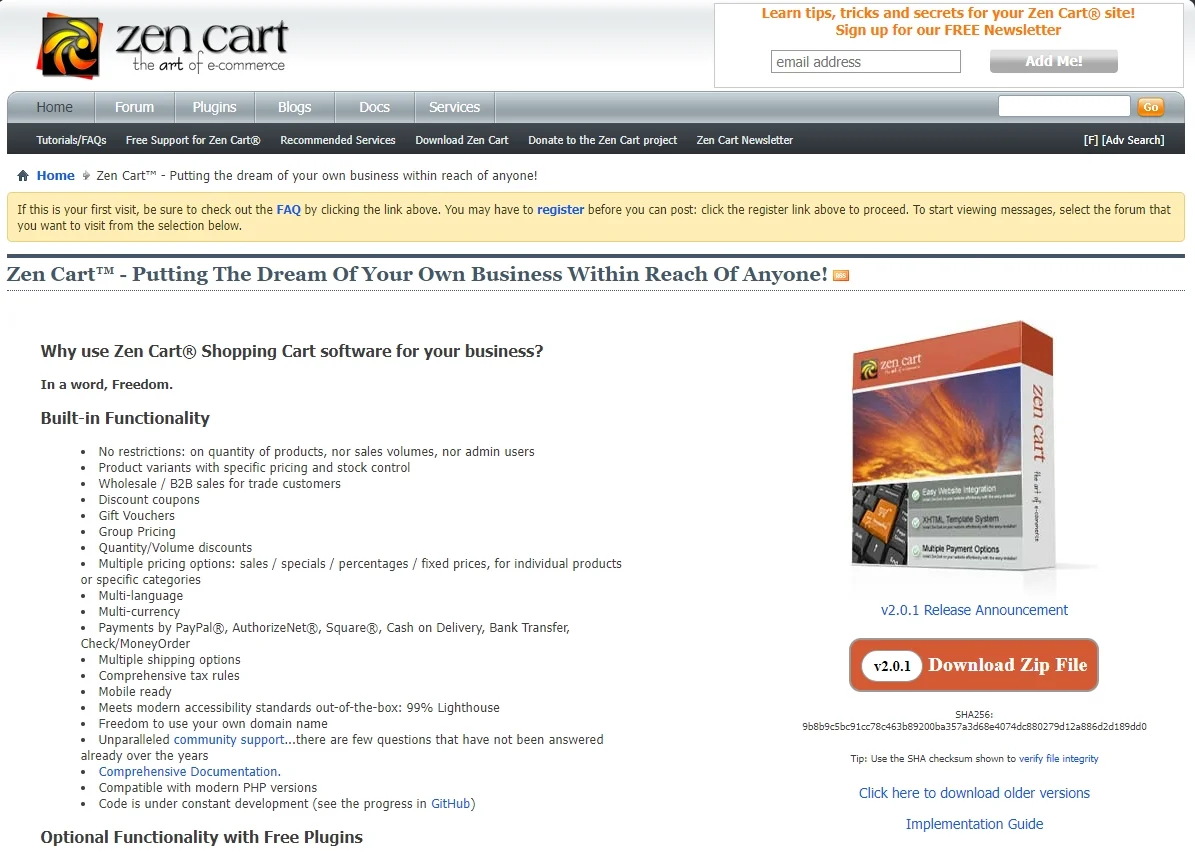
One of the key advantages of Zen Cart lies in its open-source nature. The platform's source code is freely available, allowing users to modify and extend its functionality without limitations. This level of customization attracts technically inclined users seeking complete control over their online store's design and features. A vibrant community of developers and users provides support, resources, and a wealth of extensions and templates to enhance Zen Cart stores.
While Zen Cart's technical demands may pose a challenge for beginners, experienced users benefit from its flexibility and cost-effectiveness. The platform itself is free to download and use, eliminating recurring subscription fees associated with hosted platforms like Shopify. This makes Zen Cart a potentially budget-friendly option for businesses comfortable managing the technical aspects of their eCommerce operations.
Shopify vs Zencart – Which Should You Choose
When it comes to choosing between Shopify vs Zencart, the decision largely depends on your specific business needs, technical expertise, and budget considerations. Both platforms have their strengths and weaknesses, making the choice a matter of finding the right fit for your unique circumstances.
From what I have observced and experienced, Shopify will be a better fit for you if you are:
- Users with limited technical expertise: The platform's intuitive design, drag-and-drop functionality, and readily available support make it accessible to users with little to no coding or web development experience.
- Businesses prioritizing convenience and scalability: Shopify's hosted nature, automatic updates, and wide range of built-in features allow businesses to focus on growth without worrying about technical complexities.
- Medium to large businesses: Shopify's powerful features, scalability, and extensive app store make it an ideal solution for businesses experiencing rapid growth or handling a high volume of sales.
In the meantime, choose Zen Cart instead if you are:
- Budget-conscious businesses: Zen Cart's free and open-source nature can translate to cost savings, particularly for businesses comfortable managing their hosting, security, and ongoing maintenance.
- Experienced developers and tech-savvy users: The open-source nature and customizable architecture are well-suited for users with technical skills who desire complete control over their online store's design and functionality.
- Businesses with specific functionality needs: The platform's flexibility and customization potential make it a viable option for businesses requiring unique features or integrations not readily available on hosted platforms like Shopify.
Seamlessly migrate from Zen Cart to Shopify!

Pricing
The first factor that I want to mention in this Shopify vs Zencart comparison is its monthly fee. Due to the differences in nature, both platforms offer different approaches to pricing, which appeal to different types of business.
Shopify operates on a subscription model. This means you pay a fixed monthly fee to gain access to the platform and all of its features without worrying about additional cost like hosting. Currently, Shopify provides four standard pricing plans, ranging from $5 to $299 per month, along with a dedicated set of features coming with each tier. On top of that, this platform also offers a Shopify Plus pricing plan exclusive designed for large businesses and enterprises to take their online presence to another level with advanced features and functions.
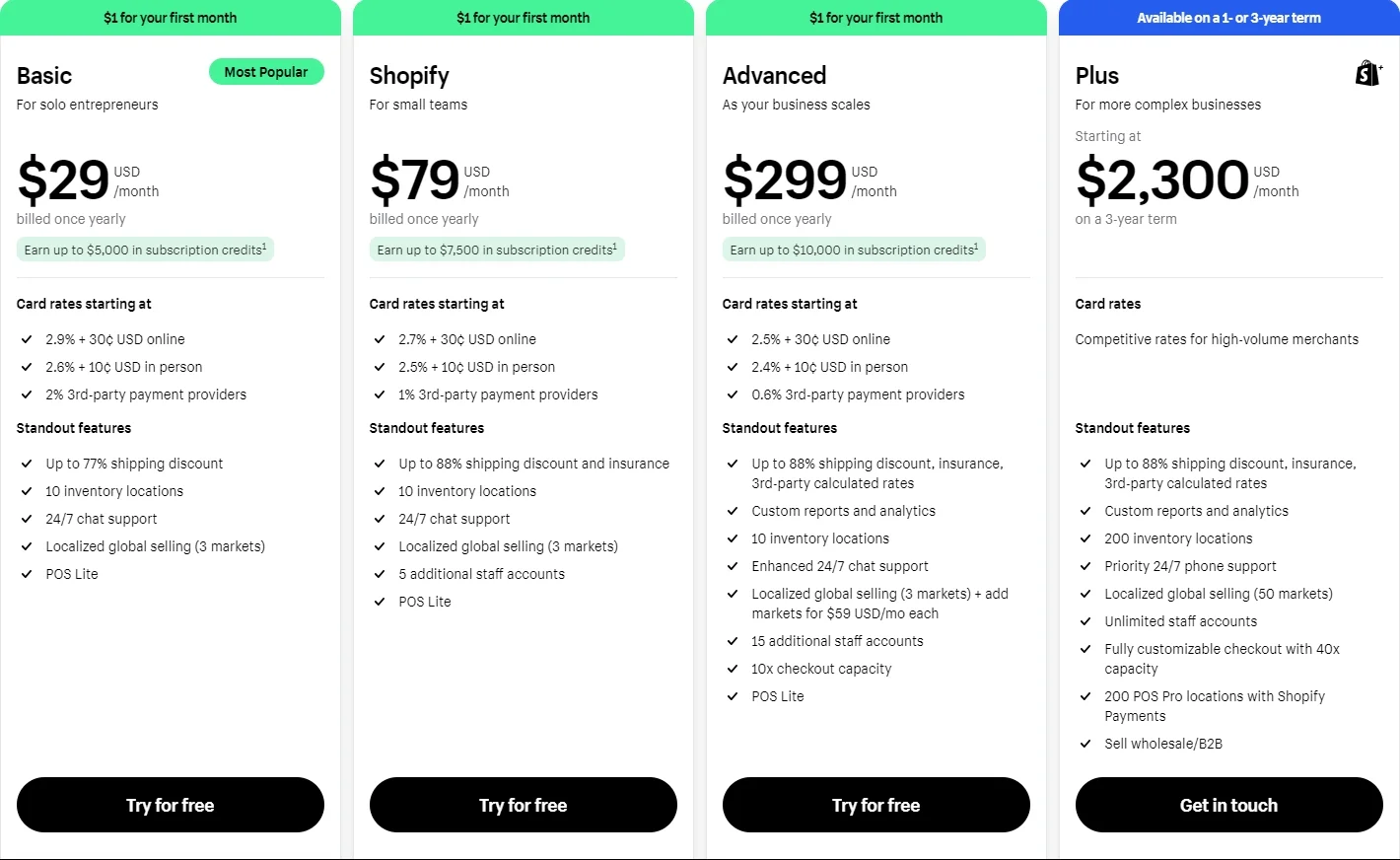
Besides this fixed monthly plan, please be aware that you might need to pay additional cost for themes and apps if you decide to opt for premium ones. Please make sure to assess your financial budget carefully beforehand to make sure you don't overspend on this platform.
To get an in-depth breakdown of each tier, don't forget to check out our article on Shopify pricing here.
Zen Cart, on the other hand, is completely free to download and use. That's right, no monthly fees! However, “free” doesn't always mean “cheaper” in the long run. With Zen Cart, you're responsible for your own hosting, security certificates (SSL), and any add-ons or extensions you may need. These costs can add up, especially if you lack technical expertise and need to hire developers for support.
Here are some common costs that you need to take into consideration when using Zen Cart:
- Hosting: From $5 to $50 per month
- Domain name: From $10 to $45 per year
- SSL certificate: Around $60 per year
- Third-party extensions and themes
- Maintenance and updates
The verdict:
While Shopify offers predictable monthly pricing, its fees can add up quickly, especially for high-volume sellers or those relying on third-party payment processors. For budget-conscious entrepreneurs, Zen Cart's zero-cost platform wins out, making it the more cost-effective option – as long as you acknowledge and factor in the potential expenses for hosting, themes, extensions, and development support.
Ease of Use
Shopify's reputation for user-friendliness is deeply rooted in its intuitive interface and streamlined design tools. Upon logging into your Shopify dashboard, you're greeted with a clean, well-organized workspace. Menus are clearly labeled, essential functions are easily accessible, and helpful tips appear contextually to guide you through various tasks. This intuitive design minimizes the learning curve, allowing even first-time users to find their way around comfortably.
Shopify takes ease of use a step further with its drag-and-drop editor, a key feature for building and customizing your storefront. Adding, removing, or rearranging content blocks like text, images, and product listings becomes as simple as clicking and dragging elements across the page. This visual approach requires no coding knowledge and allows you to see your changes reflected on your storefront in real-time. This streamlined design process empowers users to confidently create a professional-looking online store, even with no prior web design experience.
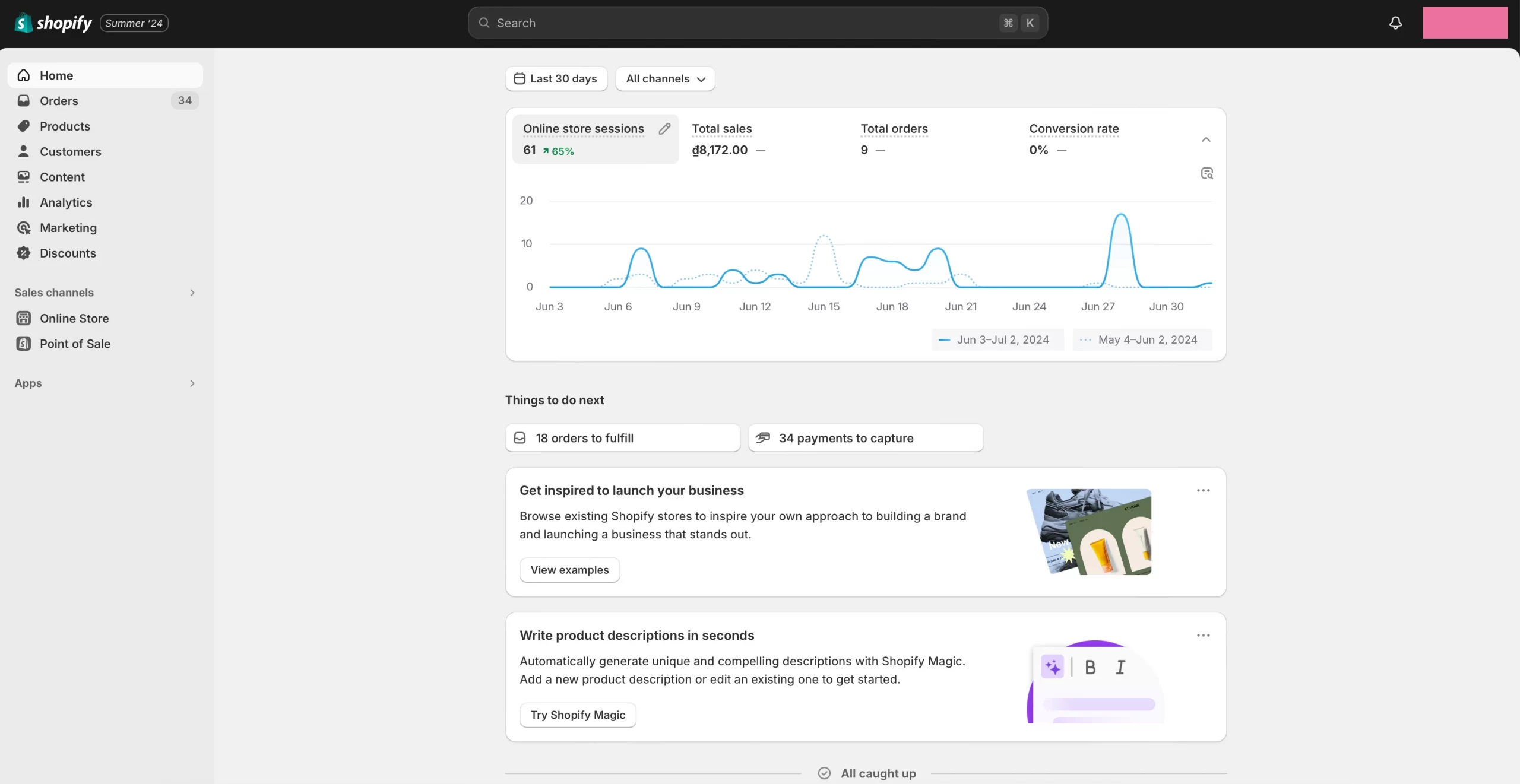
Meanwhile, Zen Cart, a robust and customizable platform, requires a degree of technical understanding for effective use. The platform's initial setup process demands more than a basic understanding of website building. From what I have experienced with this platform, you might have to spend extra time configuring settings and familiarizing yourself with the platform's structure.
Additionally, navigation within the platform can also pose a challenge for beginners. The interface, while functional, is not as intuitive as its counterpart in the Shopify vs Zencart comparison. Locating specific features or making customizations might require consulting documentation or seeking guidance from online forums. Experience with FTP (File Transfer Protocol) is often necessary for tasks like uploading themes or managing files directly on the server. Comfort with HTML and CSS is also beneficial for those looking to make significant design changes beyond basic theme customizations.
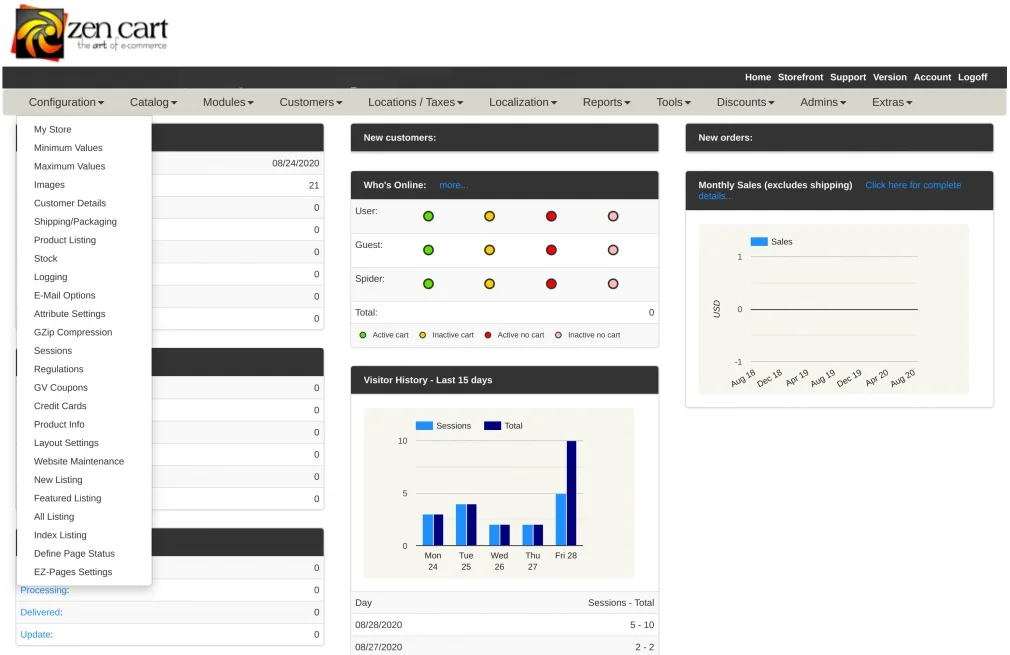
Long story short, I must say that the learning curve associated with Zen Cart can be a barrier for some users. Individuals without prior technical experience might find the platform overwhelming.
The verdict:
When it comes to ease of use between Shopify vs Zencart, Shopify is the clear winner for most users. Its intuitive interface, drag-and-drop editor, and wealth of support resources make it incredibly beginner-friendly. Even without any coding knowledge, you can create a professional-looking online store and start selling relatively quickly. Zen Cart, while powerful in its flexibility, demands a greater level of technical expertise. Its reliance on code and configuration makes it less intuitive for beginners, requiring a steeper learning curve and more time investment to master.
Themes and Customization
When comparing Shopify vs Zencart, I cannot forget to mention its selection of themes since this will make the first impression of your website.
Understanding this, Shopify prioritizes themes and design, providing users with the tools to create stunning and engaging online storefronts. From the moment a customer lands at a Shopify store, they are greeted with a visual experience that reflects the brand's identity and values. A key advantage of Shopify lies in its extensive Theme Store. This curated marketplace offers a diverse collection of 8,000+ professionally designed themes, both free and premium. Whether a business seeks a minimalist aesthetic, a vibrant and colorful look, or an industry-specific design, Shopify caters to a wide spectrum of preferences. Each theme undergoes in-depth review processes, ensuring responsiveness across devices and adherence to best practices for performance and user experience.
⮞ Bonus reading: To get more inspiration on which theme should you choose, please check out our recommendations on the best Shopify themes here!
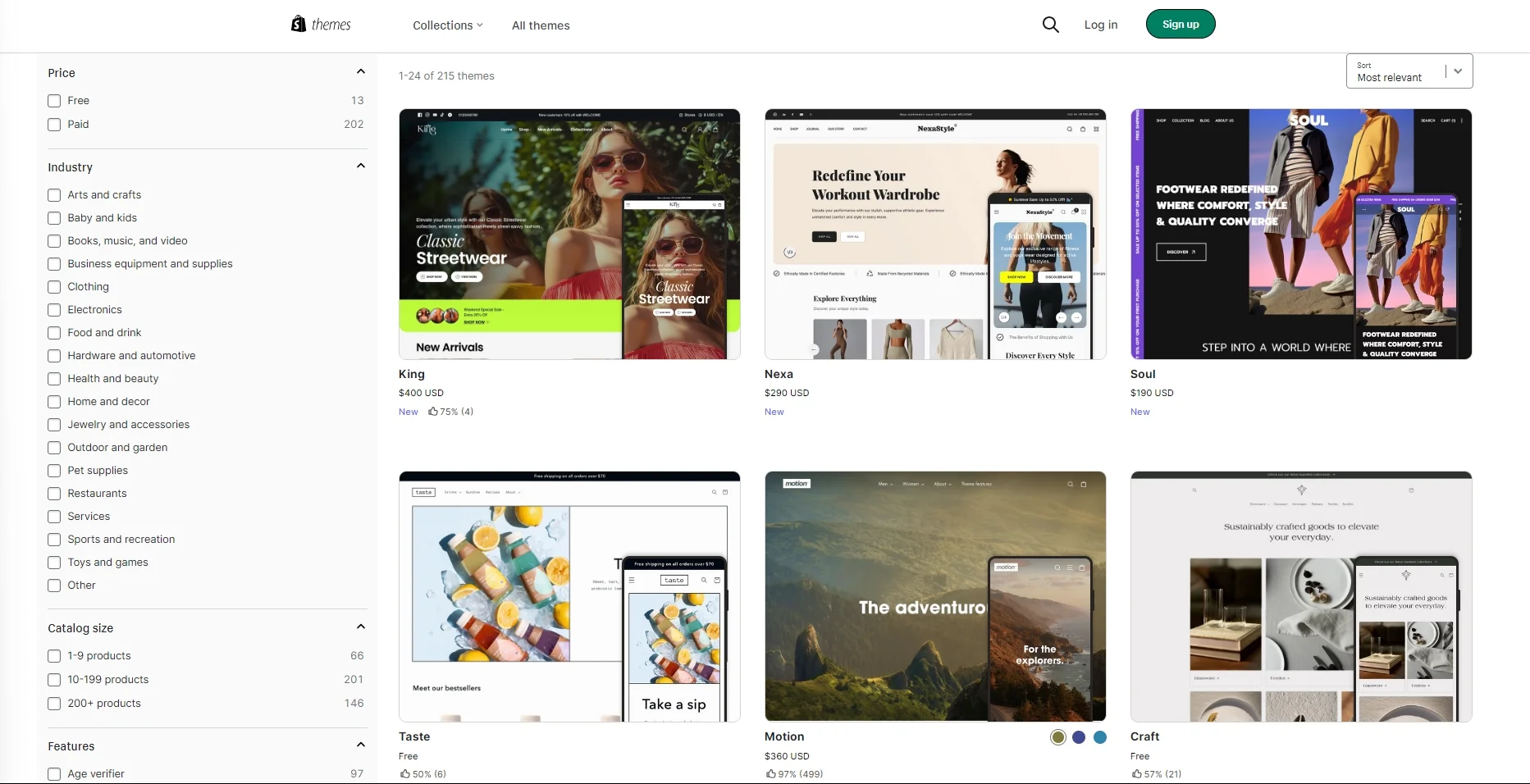
Customization options within Shopify cater to both beginners and experienced users. The intuitive drag-and-drop interface allows those with minimal technical expertise to personalize their storefronts. Adjusting layouts, experimenting with color palettes, and uploading brand assets are all tasks easily accomplished through this user-friendly system. Additionally, the ability to preview changes in real-time further streamlines the design process.
For users with coding knowledge or those working with developers, Shopify provides access to the underlying code through Shopify Liquid. This opens up a world of possibilities for advanced customization, allowing brands to fine-tune every detail of their online presence. On top of that, you can even seamlessly integrate with other page builder apps and services to extend design possibilities further.
Now let's talk about Zen Cart. This platform, known for its open-source nature and customization capabilities, offers a different approach to themes and design compared to Shopify. While not as inherently user-friendly, Zen Cart provides a greater degree of control for users comfortable working with code or those willing to partner with a developer.
Zen Cart equips its users with a vast library of themes, both free and paid. These themes, available from various third-party marketplaces and individual developers, offer a wide spectrum of aesthetics and functionalities. From minimalist templates to feature-rich designs catering to specific industries, businesses can find a starting point for their online presence. However, due to the open-source nature of Zen Cart, theme quality and support can vary significantly. Users must carefully evaluate options, considering factors like responsiveness, code quality, and documentation before committing to a theme.
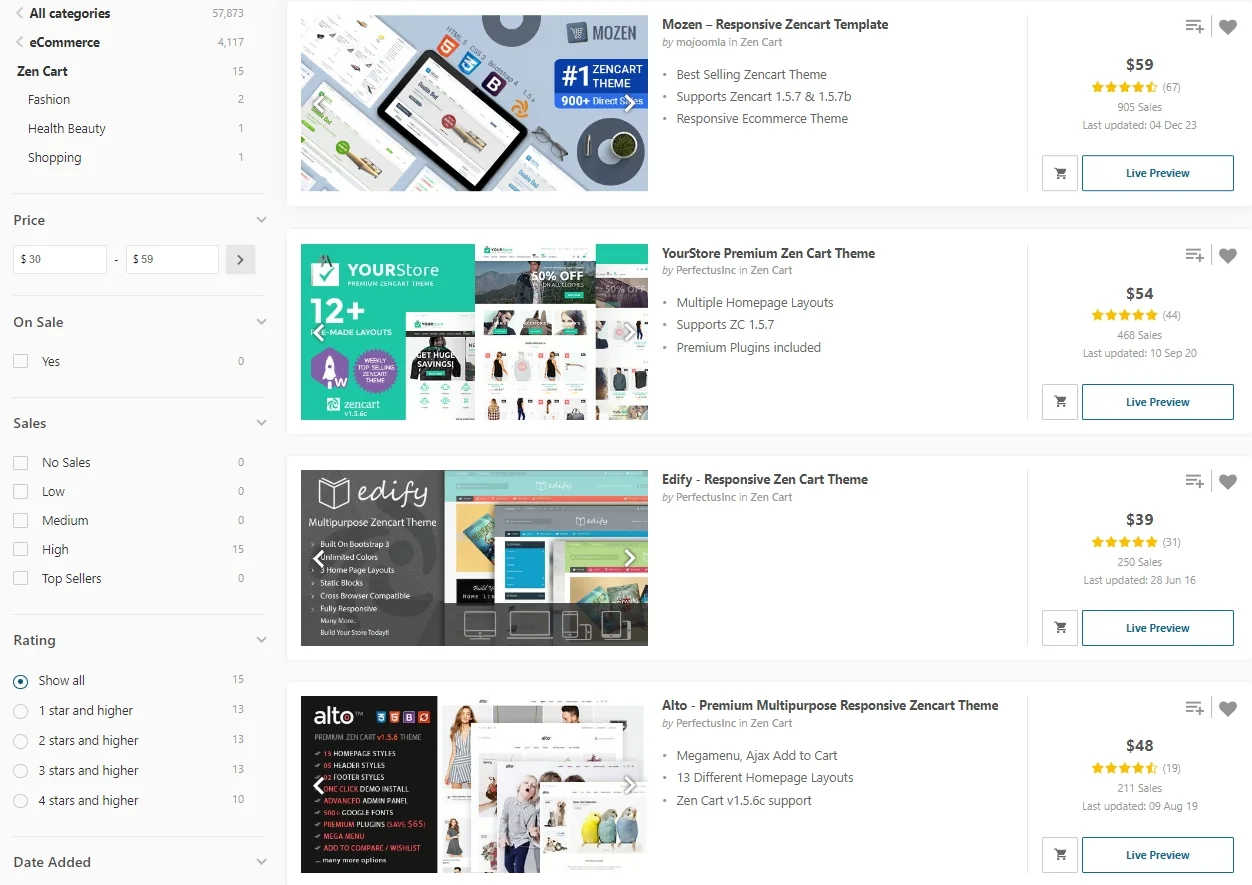
Customization within Zen Cart often necessitates a more hands-on approach. While basic adjustments like color modifications or font changes might be possible through the administrative interface, achieving truly unique designs typically requires working directly with code. Familiarity with HTML, CSS, and in some cases PHP, is often necessary to unlock the full potential of Zen Cart's customization capabilities.
This reliance on coding can be a barrier for some users, particularly those without technical backgrounds. However, for individuals or businesses with coding knowledge or those willing to invest in developer support, Zen Cart opens doors to a world of design possibilities. The ability to directly manipulate code allows for granular control over every aspect of the storefront's appearance and functionality, enabling the creation of truly unique and memorable online shopping experiences.
The verdict:
When comparing Shopify vs Zencart solely on themes and customization, Shopify stands out as the superior choice for most users. Its tightly curated theme store ensures high-quality, responsive designs, while its drag-and-drop interface makes customization intuitive and accessible, even for beginners. Zen Cart, though offering greater flexibility through direct code editing, might present a steeper learning curve.
Payment Gateways
Shopify has developed a robust and versatile payment gateway system designed to accommodate the diverse needs of businesses and their customers worldwide. At the heart of Shopify's payment processing capabilities is Shopify Payments, the platform's native payment gateway powered by Stripe. This tightly integrated solution offers several benefits for businesses, including simplified transaction processing, transparent pricing, and enhanced security measures. By eliminating the need for third-party payment gateway integrations, Shopify Payments streamlines the checkout process for customers and reduces the administrative burden on business owners.
Beyond its native gateway, the platform seamlessly integrates with over 100 third-party payment providers, ensuring businesses can cater to specific geographical or customer preferences. Whether it's popular options like PayPal, Square, and Stripe, or region-specific providers catering to niche markets, Shopify's extensive integration library provides businesses with the freedom to choose the solutions that best align with their needs. On top of that, recognizing that customers prefer transacting in their local currencies, Shopify enables businesses to configure their stores to accept payments in various currencies automatically. This customer-centric approach simplifies the shopping experience for international buyers, potentially reducing friction during the checkout process and minimizing cart abandonment rates.
Zen Cart, as an open-source platform, offers flexibility in payment gateway integration, but it comes with a trade-off: increased technical configuration. Unlike Shopify's streamlined approach, Zen Cart often requires more hands-on involvement from the user, particularly those without a strong technical background.
Zen Cart doesn't have a native payment gateway like Shopify Payments. Instead, it relies entirely on integrating with third-party providers. This means users need to select and set up their preferred gateways individually, often involving navigating technical documentation and potentially making code adjustments. The platform supports a wide range of payment gateways, including popular options like PayPal, Authorize.net, Stripe, and Worldpay, as well as many regional and specialized providers. This extensive list provides users with choices, but the onus falls on the user to research, choose, and configure the gateways that align with their needs and target market.
However, I must say that for users seeking simplicity and ease of use, Zen Cart's approach to payment gateways can be a significant drawback. The lack of a native gateway and the need for manual configuration adds complexity to the setup process. Additionally, troubleshooting integration issues might require technical expertise, potentially leading to delays and frustration for users unfamiliar with web development concepts.
The verdict:
Between Shopify vs Zencart in terms of payment gateways, I believe Shopify is the outright winner. Its built-in payment solution, Shopify Payments, simplifies transaction processing and eliminates third-party fees for many users. On top of that, Shopify's intuitive interface for managing additional gateways and its extensive selection of integrations provide both convenience and flexibility.
Security
When comparing Shopify vs Zencart, their security setting is a factor that we should not ignore.
Shopify prioritizes security at every level, providing a secure platform for both businesses and their customers. The company invests heavily in infrastructure and adheres to industry best practices to ensure a safe and trustworthy eCommerce environment. Shopify's platform is Level 1 PCI DSS compliant, the highest level of security certification in the payment card industry. This certification signifies that Shopify meets stringent security requirements for handling sensitive customer data, including credit card information. Regular security audits and vulnerability assessments are conducted to maintain this compliance and proactively address potential risks.
Data encryption is another crucial aspect of Shopify's security measures. The platform utilizes industry-standard SSL (Secure Sockets Layer) certificates to encrypt all communication between a user's browser and the Shopify servers. This encryption ensures that sensitive data, such as login credentials and payment information, remains protected from unauthorized access during transmission.
On the other hand, Zen Cart approaches security as a shared responsibility between the core software and the individual user. While the platform provides a solid foundation for security, maintaining a secure online store requires ongoing vigilance and proactive measures from the merchant. Zen Cart's open-source nature means its code is publicly accessible, allowing for scrutiny from the community and developers. This transparency can lead to quicker identification and resolution of vulnerabilities compared to closed-source platforms. However, it also means potential security flaws are visible to malicious actors, necessitating prompt updates and patching.
The platform offers built-in security features like password encryption and basic fraud detection tools. However, the responsibility for implementing more robust security measures often falls on the user. This includes choosing secure hosting providers, regularly updating Zen Cart core files and extensions, and potentially installing additional security plugins.
The verdict:
When it comes to security between Shopify vs Zencart, I believe Shopify is a more secure option, particularly for users without extensive technical expertise. Shopify's hosted platform, Level 1 PCI DSS compliance, and built-in security features provide a robust and closely monitored environment. Regular updates and security patches are handled automatically, ensuring ongoing protection against emerging threats.
Shopify vs Zencart – FAQs
What is the difference between Zencart and Shopify?
The key difference between Shopify vs Zencart lies in their hosting. Shopify is a hosted platform, meaning they manage all technical aspects (servers, security, updates) for a monthly fee. This makes it user-friendly but less customizable. Zencart is self-hosted and free to use, giving you full control but requiring technical expertise to set up and maintain.
Is Shopify better for eCommerce?
To be honest, the answer depends on your needs and skills. Shopify is generally better for most users due to its ease of use, built-in features, and scalability. However, tech-savvy users who prioritize customization and cost savings might prefer Zencart.
What is the downside of Shopify?
Here are some major drawbacks that Shopify users might need to consider before choosing this platform:
- No control over monthly pricing
- Technical expertise required for advanced customization
- Transaction fee
Is Shopify worth it for beginners?
Absolutely! Shopify's user-friendly interface, step-by-step guidance, and 24/7 support make it incredibly easy for beginners to build and manage an online store. It removes the technical hurdles, allowing you to focus on your products and customers.
Final Thoughts
Long story short, the “best” platform in the Shopify vs Zencart comparison depends entirely on your individual business needs and priorities. Shopify shines with its user-friendly approach, making it ideal for businesses seeking a streamlined and scalable solution, particularly those with ambitious growth plans. Zen Cart, on the other hand, appeals to a more technically inclined user base seeking maximum customization and control over their online store. Therefore, you'll need to assess your business and weigh both options carefully.
If you like this article and want more information about both platforms, don't forget to check out LitExtension blog for more in-depth reviews and expert insights.

